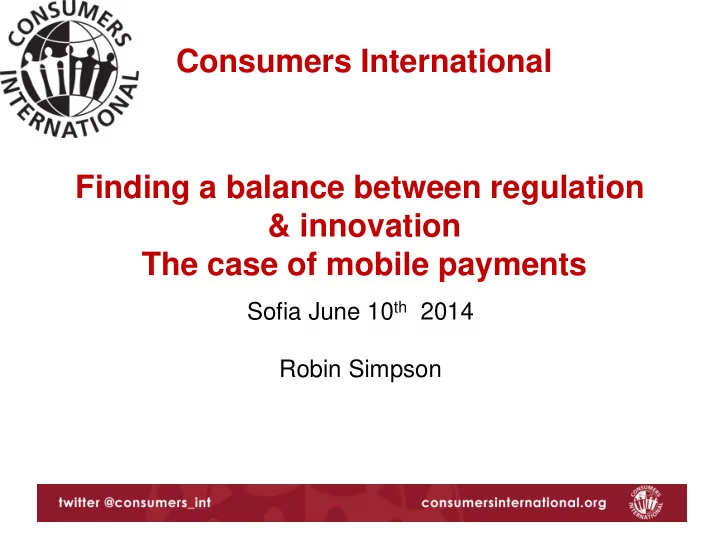

Consumers International Finding a balance between regulation & innovation The case of mobile payments Sofia June 10 th 2014 Robin Simpson
Consumers International • 240 member associations in 120 countries; • Recognition by UN, OECD, ISO; • Independent & not-for-profit; • Global research & campaigns through & for members; • Offices in London, Kuala Lumpur, Santiago de Chile, Pretoria and Oman; • Programmes on financial services and consumers in digital age.
M-payment issues raised by CI members • Tangible proof of payments; • Reliability of crediting systems; • Interoperability; • Unclear regulatory status; • Lack of impartial dispute resolution; • Lack of ‘currency’; • Dormant assets; • Digital certificates; (no IMEA number) • Excessive charges for remittances; • Continuing problems of access;
CI starting position • CI participated in drafting UN guidelines on CP (1985, 1999 & 2014), OECD GLs on e-commerce, (1999 & 2014); dispute resolution (2007 & 2014); G20 work on consumer protection in FS (2011-present); remittances; • now m-commerce in ISO & OECD; • Normally favour regulatory approach for FS sector; • In this case CI has favoured more liberal approach following successes in E. Africa & Phillipines; • 1 billion+ consumers with mobile phone but no bank; • 2.5 billion mobile payment users expected by 2015. • USA expected x 10 between 2008 & 2013;
So what are we doing? 1. ISO TC 68 financial services/SC7/WG10 on draft ISO 12812 mobile financial services: most members industry stakeholders; inc. US Federal reserve bank, Kenya central bank, European Payments Council; card manufacturers; 2. OECD Consumer policy (CP) committee: mainly OECD CP agencies + CI + Business & Industry Advisory Committee; also OECD G20 task force; 3. UN Guidelines on Consumer Protection: UN delegations, CI and Chambers of Commerce
Draft standard ISO 12812 Mobile financial services 5 papers: 1. General framework; 2. Security & data protection; 3. Financial application management; 4. Mobile payments to persons (P2P) 5. Mobile payments to businesses (C2B) • Great debate over titles- what is a person?
ISO: Key issues for CI • POCP: plain old consumer protection: contract terms, transparency, complaints/dispute resolution; legal status of electronic receipts; • Limited consumer liability for breaches of security- big debate: lessons from evolution of credit cards; • principles of data protection ; • Financial inclusion ; • Abandoned/dormant assets : old problem in new form; • Good practices enabled by technology : transaction logs, pop-ups for billing notices, facilities for visually handicapped;
ISO: Lessons • Standards cannot legislate, but may become, or may support, legislation/regulation downstream; • What is basic to CP bodies may be new to industry; • What is basic to industry may be new to CP bodies: eg differences between digital wallet & electronic purse? • If systems are safe, the industry should be relaxed about limited liability for consumers; • If systems not safe, we need limited liability; • So, we need limited liability; • Inter-operability: no differences on substance, only on emphasis;
OECD policy guidance on mobile and online payments 1. Information disclosure 2. Privacy: principles drafted 1980 updated 2013; 3. Security: principles drafted 2002: emphasise ‘ shared responsibility ’ ; 4. Confirmation process 5. Protection of children: children cannot contract; 6. Protection varies by jurisdiction & transaction type; 7. Fraudulent, misleading, unfair commercial practices 8. Dispute resolution and redress 2014 report – Consumer Policy guidance in online & mobile payments
Lessons from OECD negotiation • Emphasis on shared responsibility of ‘ participants ’ ; participants intrinsically unequal; • Limits of consumer education and disclosure:average time taken to read a digital agreement: 6 seconds; • Limitations of inter-governmental processes: eg remittances not covered; G20 process gave little attention to consumer credit – covered by FSB; • Negotiated text necessitates compromise;
What does CI want for FS from UN guidelines? • Data protection. • Technological neutrality of CP; • Interoperability; • Dispute resolution; • Contract terms, transparency, security; • Portability & transparency; • Financial inclusion; • Remittances • Responsible lending; • Bank deposit guarantees
Overall lessons • Tech advances hold great promise for consumers; eg potential benefits for FS, remittances and utilities; can enhance children ’ s security eg transport and meals; • Monopolies can be reduced; eg: mobile telephony in low income countries; same needed in remittance sector; • technological development can heighten issues of CP because of speed of transaction; eg need for ‘ cooling off ’ ; consumers skip contracts when ‘ timed out ’ ; • Many consumers expert on technology but not on CP law; ask your 6 year old! • new technology but permanent issues
Robin Simpson rsimpson@consint.org
Recommend
More recommend